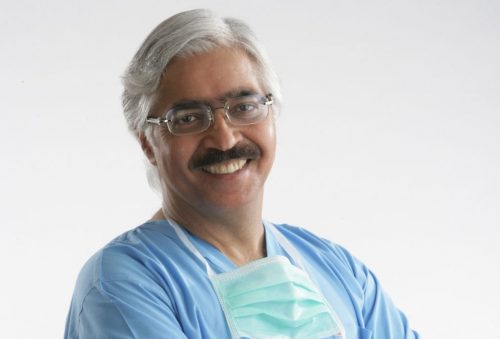- Home
- Editorial
- News
- Practice Guidelines
- Anesthesiology Guidelines
- Cancer Guidelines
- Cardiac Sciences Guidelines
- Critical Care Guidelines
- Dentistry Guidelines
- Dermatology Guidelines
- Diabetes and Endo Guidelines
- Diagnostics Guidelines
- ENT Guidelines
- Featured Practice Guidelines
- Gastroenterology Guidelines
- Geriatrics Guidelines
- Medicine Guidelines
- Nephrology Guidelines
- Neurosciences Guidelines
- Obs and Gynae Guidelines
- Ophthalmology Guidelines
- Orthopaedics Guidelines
- Paediatrics Guidelines
- Psychiatry Guidelines
- Pulmonology Guidelines
- Radiology Guidelines
- Surgery Guidelines
- Urology Guidelines
First in India : Fortis Cardiologist implants world’s smallest heart pump

Could provide hope for the treatment of numerous patients who are in cardiogenic shock after a heart attack or have to undergo high-risk angioplasties or surgery because of weak hearts.
Fortis Escorts Heart Institute, Centre of Excellence in Cardiac Care, achieved yet another milestone of success when a team led by Dr Ashok Seth, Chairman, Cardiovascular Sciences, performed India’s first “Protected Angioplasty and stenting procedure” with support of Impella Heart Pump
The patient was suffering from life-threatening blockages, who was at extremely high risk for bypass surgery. The new ‘Impella Device’ is the ‘world’s smallest heart pump’, which can support a failing heart for up to 7-days and occasionally longer. The Impella Device is like a catheter and works on the principle of a submersible water pump; it is a thick as a pencil and approx. 6 inches long. Unlike other devices (which are large and need a surgery to implant) the Impella can be inserted into the heart without an operation percutaneously through the groin artery in the Cath Lab; it can provide blood flows of 2.5 – 3.5 liters/min. Impella heart pump is used to help maintain stable heart function and to help ensure blood flow is maintained to critical organs such as the brain and kidneys in cases of cardiogenic shock or during high-risk angioplasties or surgeries.
Once in position, the Impella heart pump withdraws blood from the left ventricle and expels it into the ascending aorta, the same effect that happens with the pumping motion of your heart.
Speaking to Medical Dialogues team, about the device and its implantation, Dr. Ashok Seth said "The Impella can support failing heart (cardiogenic shock) due to heart attack or myocarditis for up to 7-days or even longer till heart recovery occurs. It can also be used to support the heart in cases of high-risk angioplasties (Protected PCI) in patients with poor heart function and where surgery is considered too risky. It has been proven to support the heart to improve the safety of the procedure and improve outcomes. When the procedure is over or the heart recovery occurs, the device can just be pulled out and removed as it is like a catheter. It is approved in and has been used in USA and Europe for the last few years and has been introduced into India now."
The device was used for the first time on Tuesday, 26th June 2018 to treat an 86-year old gentleman who was admitted to Fortis Escorts Heart Institute with severe recurrent chest pains over a week and impending heart attack. An angiogram revealed all his arteries were more than 90% blocked with very hard, calcium deposited life-threatening blockages. He had a prohibitive risk for surgery so angioplasty was performed as a lifesaving procedure under the support of Impella heart support. The patient had Rotablator drilling performed on all three arteries to remove the calcium followed by implantation of five stents in a procedure lasting for 2½ hours.
The heart was supported throughout on the Impella pump to maintain stable pressure and perfusion to brain and kidneys. The patient remained conscious, stable and complication free throughout the procedure. The patient continued the recovery and was transferred to the CCU and was gradually weaned off the pump, which was removed after 5-hours. After the patient stabilized and was in CCU, the Impella pump was removed after 5-hours. The 86-year old gentleman is now well and walking around two days later.
Explaining the case, Dr. Ashok Seth said :The device supported the heart admirably to keep the patient stable throughout the very complex angioplasty procedure and afterward for recovery. It was an extremely high-risk angioplasty which was successfully performed without any complications with a good supply of blood being maintained to the kidneys and brain. "
With the landmark surgery, FEHI initiated the first “Heart Recovery Program” in the country where a patient with weak hearts and cardiogenic shock can be supported at angioplasty or in CCU to allow the heart to recover by implanting a miniature catheter-based heart pump, without surgery. The device can also be used to transport a patient in shock to tertiary centers where advanced treatment can be instituted to help survival.

Disclaimer: This site is primarily intended for healthcare professionals. Any content/information on this website does not replace the advice of medical and/or health professionals and should not be construed as medical/diagnostic advice/endorsement or prescription. Use of this site is subject to our terms of use, privacy policy, advertisement policy. © 2020 Minerva Medical Treatment Pvt Ltd